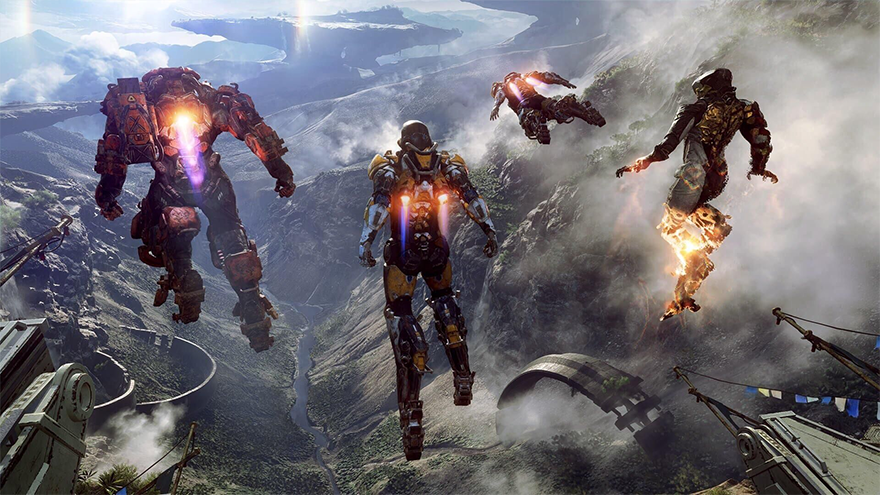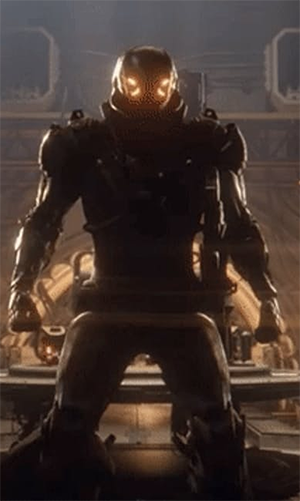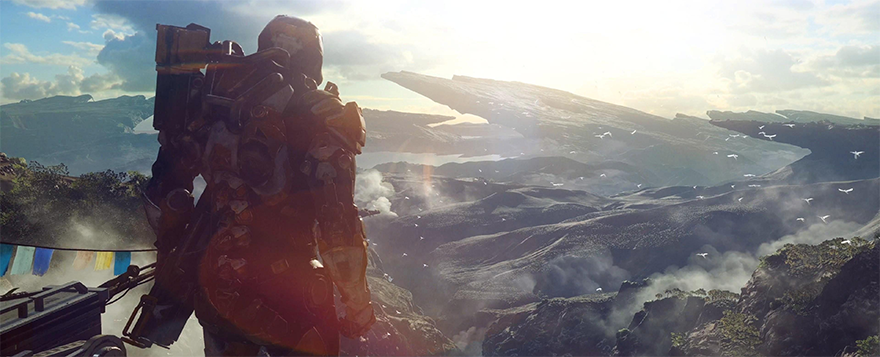
Like everyone else working in or around the gaming industry, I read Kotaku’s Jason Schreier’s exposé on BioWare’s development of Anthem. And like many of you, I read it having a hard time believing just how terrible things were, even as someone who covers a major BioWare online title, SWTOR, regularly in this very column. There were issues with Anthem, from production and marketing to actual launch, but I had trouble wrapping my head around some of the things said. Then after some tweets by the likes of Trion’s Scott Hartsman and the follow-ups by Jason Schreier himself, I began to wonder if this isn’t just a symptom of something greater in gaming development.
Before I jump into the meat of this, I want to give my thanks to Schreier for putting the original piece together. I understand the time and work that he put into his piece. Although I might criticize parts of the article, I don’t believe that it is bad or false or any other negative adjective. I also don’t believe that anyone from BioWare is lying or that they didn’t go through any of the things mentioned in the original article. Working in the gaming industry is difficult, but I will get into the details of that later. I just want to give my respect to those who were quoted in the article and the reporter conveying the story.

A certain point of view
Tell me if you relate to this: Someone tells you a story that might be difficult to hear. Let’s say that someone hit your friend’s dog. Obviously, your friend would be distraught and focused on caring for the dog. He tells you the story of how he heard the dog getting hit, ran around to the front of his house, saw the car that hit the dog speeding away, and immediately checked on the dog. He explains in great detail about the dog’s injuries and how scared he was. He tells you about making sure that he could move the dog before placing him into his car with the help from neighbors. It is super moving and very tragic.
Obviously, he is upset at the person who hit the dog and just drove away. Clearly, only a terrible person would do that. Any sane and moral person would agree, the driver of the car lacks all qualities of decency. And you, being a good friend, would want to hunt that person down to get justice for the injured dog. I would, too.
When I was a kid my grandmother used to tell me that there were two sides to every story. She was a very even-tempered person and taught me a lot about understanding people. She used to work with all different kinds of employees and customers as a manager at a grocery store for twenty years. Some things can be missed because of a person’s perspective, so it’s always good to look at the other side of the story. In the case of the hit-and-run, the friend seemed to miss the part where the car driver actually turned around when he realized what happened and actually helped carry the dog into the car. The friend wasn’t lying in this story, but his perspective skewed.
In the Anthem story, we read everything from the perspective of 19 employees of BioWare who are willing to talk to the press about their grievances with BioWare. Obviously, bad things happened to these employees, and I am not denouncing their testimonies. But it’s always good to understand and hear the other side.
As a reporter, you do what you can to get all sides of the issue, and Schreier did his best, I believe. According to his update, he sent a summary of the article to BioWare so it could respond, but received nothing back. In fact, according to an internal memo reportedly given out to BioWare staff by General Manager Casey Hudson, BioWare refused to reply, citing that “naming of specific developers as targets for public criticism” as “out-of-bounds” and BioWare would not participate in the article officially.
 Truth without bias
Truth without bias
Finding an unbiased truth is impossible even in the most in-depth scientific journals. Thinking that there isn’t bias in an article on Kotaku or any other news outlet would be ignorant. Bias doesn’t mean that the reporter did a bad job; that’s just the way it happens, especially when you toe the line between informing and keeping readers interested. We do that every day on this site. It doesn’t mean that the information is untrustworthy or needs to be taken with a grain of salt; it means that the story might have to be run through a sieve.
Enough with the metaphors.
What unbiased truth can we garner from the article and the subsequent follow-ups from BioWare and other developers? We know that people left BioWare for mental-health reasons related to stress. We know that the Frostbite engine gave the developers trouble and added to the long development time. We know that several different studio leaders took the reins of Anthem over the seven years of development. We know that there was a heavy crunch before Anthem’s launch.
Because I am inclined to believe the developers that spoke to Schreier, I will also accept the stories of many staff wanting Dragon Age: Inquisition to fail because of struggles with the engine. I will also accept stories of EA VP Patrick Soderlund being highly disappointed in the Anthem Christmas demo and the team having to reiterate a demo in six weeks to fit his liking.
I do, however, have a hard time taking some of the subjective statements at face value. Much of what was said about “BioWare magic” is skewed because of bias against the way the management handled issues, the management attempting to keep morale up, or just a misunderstanding of how things work in a creative field. I don’t think that the developers were lying about what was said, but I do believe that their perspective weighs very heavy on those statements.

The problem is systemic
When I was in high school and college, I did a lot of work in the stage productions both on the stage and behind the scenes. There is always crunch-time. There are always last-minute things that needed to be done. The producers, stage managers, and directors all have a hand in how time is managed.
I remember working on a production of Little Shop of Horrors that seemed to come together very smoothly from a production standpoint. There were some missteps when it came to acting choices, but I was surprised at how all the puzzle pieces came together in the end. Of course, there was crunch-time, and we were afraid that some things wouldn’t work out. There were stresses and arguments, but it came together.
But then I think about the production of The Boys Next Door that I also did in college. The stage manager was the same as for Little Shop, but the director was different. The production was riddled with issues from set design to lighting to sound design. Honestly, I’m surprised that play even came together at all. There was stress to the point that the director came up to my sound booth and screamed at me about a minor mistake I made during a final run-through.
Anthem had multiple different directors, producers, and other creative heads that burned out during the project or came into the project already burned out. That alone is going to extend production time by years. That alone is going to cause stress and a heavier crunch-time.
This kind of problem doesn’t just exist with Anthem alone. It exists in all creative fields, from stage productions to movies to other games. Scott Hartsman from Trion said on Twitter that this kind of thing happens far too often with online games: “It’s far too common to have ‘the game you play’ being an effort whose mass was largely created in the final 10-12 months of a long dev cycle with next to no time for iteration.”
We had a saying in the theater: “A bad final run-through means a great opening night.” That reminds me of the statements about “BioWare magic.” Stage managers and directors didn’t say these things because they wanted the crew to take things on “blind faith” as one of the BioWare developers suggested in the original article; they wanted the crew to have confidence in what they were doing and the team they worked for. If morale is low, having trust in yourself and your team can boost it. And it was clear that BioWare needed that during most of Anthem‘s production.

A takeaway
The situation with BioWare and Anthem was horrible. It’s not something I wish for anyone to have to deal with. I know it is far too common in the gaming industry. I want the mental health of game developers to be paramount. I also want developers to get paid what they are worth by multi-million dollar corporations, so when crunch-time comes, they are better equipped to deal with that instead of worrying about how they are going to make rent. Other creative industries have unions, like the Screen Actor’s Guild or the International Alliance of Theatrical Stage Employees, to protect the interests of those working on the day-to-day of making entertainment. Maybe that’s the answer.
The situation isn’t a BioWare issue. It’s not isolated to Anthem. It’s not exclusive to BioWare. And it’s not even every BioWare production, either, even after it was bought by Electronic Arts.
When BioWare invited the press to talk to people about Anthem, everything was extremely closed off and controlled. I talked about this and some of my other concerns in my PAX West piece about Anthem.
My experience with BioWare’s Star Wars: The Old Republic was much different. There was a pretty solid demo a couple of years before the game launched and a couple more good demos leading up to launch. I’m not saying that there wasn’t a crunch or that SWTOR was perfect. The atmosphere was different. At the fan-site summit before the game launched, future players could talk directly to the developers, ask questions, and play through a few parts of the game without the heavy oversight we experienced with Anthem.
I don’t have all the answers; in fact, I have very few answers. But I do believe that we need to take a hard look at what gaming corporations are doing to the people working for them. We need to try to understand the perspective of everyone involved. My hope is that BioWare is able to right this ship and that EA doesn’t swallow another wonderful studio. And I hope that we players better appreciate the struggles of working in the gaming industry. Ultimately, I hope that companies make better games made under better circumstances.















